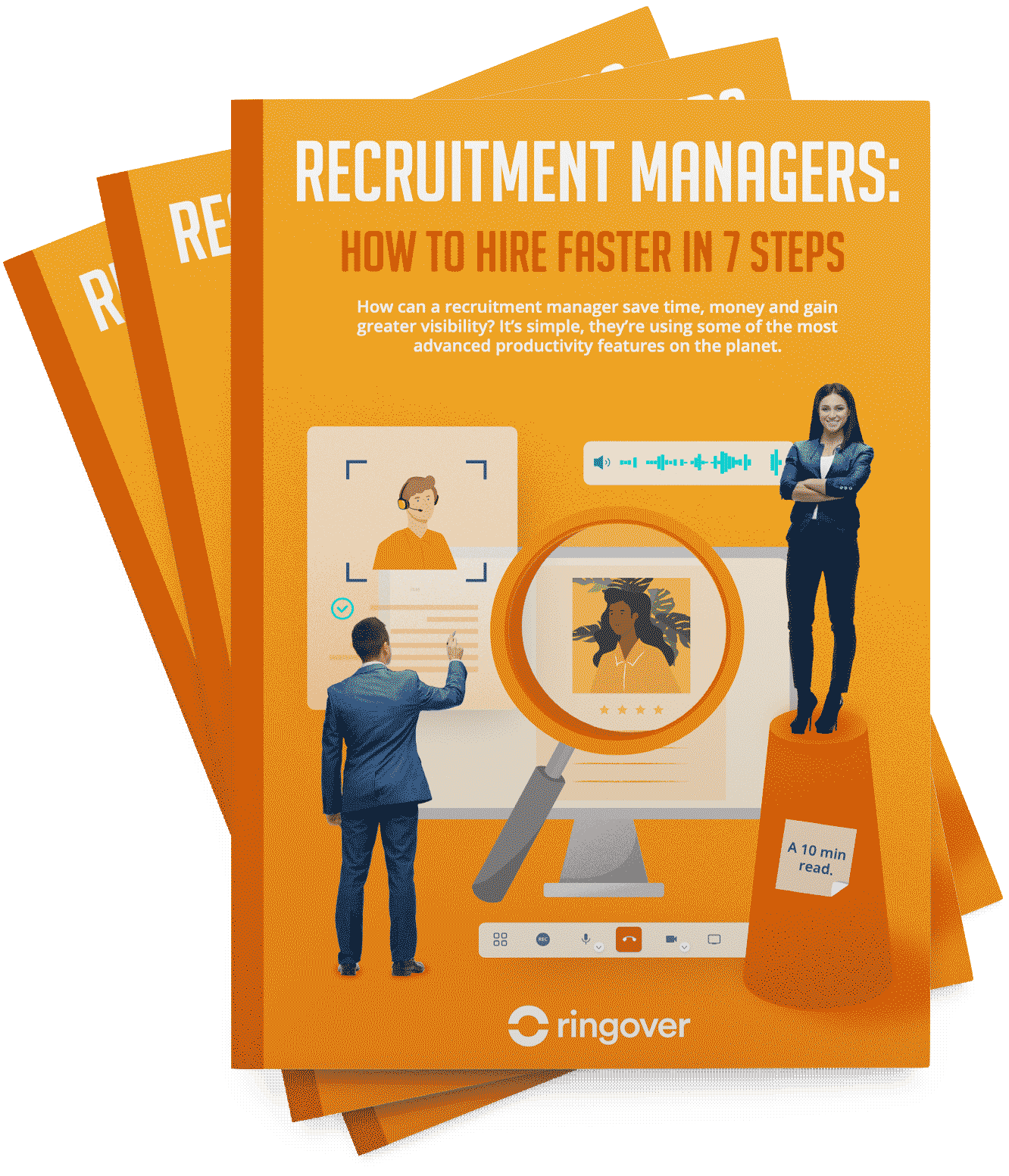Summary
This article will guide you through the essence of mobile recruiting, its significance, and strategies for a successful recruitment process. Additionally, you will explore the advantages and challenges associated with mobile recruiting, along with answers to common queries and top strategies.
Discover Ringover For Recruitment6 Best Mobile Recruiting Strategies
1. Optimize Your Career Site and Job Postings for Mobile Devices
Prioritizing mobile optimization for your career site and job postings is essential. Ensure these platforms are responsive, adapting seamlessly to various screen sizes and orientations. Pages should load quickly and be straightforward to navigate, incorporating an attractive visual design. Job descriptions ought to be succinct and transparent, emphasizing the key qualifications and benefits related to the position. Additionally, application procedures should be streamlined, requiring only vital information and offering options for resume uploads or LinkedIn profile submissions.
2. Utilize Social Media to Promote Your Employer Brand and Job Openings
Engage in connected recruiting and leverage the vast potential of social media for mobile recruiting to access a broad and diverse candidate pool. Platforms like Facebook, Twitter, Instagram, and LinkedIn are excellent for social recruiting and showcasing your corporate culture, values, and successes, alongside job advertisements. Implement hashtags, keywords, and geo-targeting to enhance your visibility and relevancy. Encourage your staff to disseminate your content and direct their connections to your vacancies.
3. Engage Candidates Through Omnichannel Communications
When it comes to capturing the best clients, a stellar candidate experience makes all the difference. Having omnichannel communications allows you to reach candidates on the channel they prefer, giving you the edge over competitors. VoIP software like Ringover allows you to create personalized outreach and efficiently take care of tasks like interview scheduling, remote interviews via videoconference, and even delivering feedback surveys.
4. Conduct Virtual Interviews via Video or Audio Calls
Virtual interviews offer a practical and cost-saving alternative for evaluating candidates through mobile. Depending on your requirements, you can opt for live or pre-recorded interviews using video or audio calls. Video interviews provide visual and auditory cues, allowing you to gauge a candidate's body language and persona. Audio interviews focus on vocal clarity, tone, and verbal aptitude, minimizing bias and distractions. And if you use Empower, a conversation intelligence software, conversations conducted via phone will be automatically transcribed, summarized, and analyzed with AI-powered sentiment analysis. This allows you to identify and search through conversations easily via topics or key moments. Not only will you get better insight into your customers and what elicits strong emotional reactions from them, you can also better identify best practices from high-performing employees.
5. Leverage Mobile Recruiting Software to Enhance Your Process
Mobile recruiting software like Bullhorn streamlines and automates your recruitment workflow. It facilitates the creation and distribution of mobile-optimized job listings, career sites, and application forms, in addition to tracking your mobile recruiting efforts and outcomes. Plus, options like Vincere and Recruit CRM offer integrations with complementary VoIP phone software like Ringover. The adoption of mobile recruiting software can lead to significant time, cost, and resource savings, thereby enhancing your hiring quality and candidate experience.
6. Implement DEI Practices in Your Mobile Recruiting
Embracing diversity, equity, and inclusion (DEI) practices within mobile recruiting can greatly benefit your efforts to attract and retain a diverse workforce that mirrors your customer base and society at large. Ensure your career site and job postings are accessible and welcoming to all candidates, regardless of background, identity, or abilities. Employ mobile technology to mitigate bias and discrimination during your screening and selection phases, through methods like anonymized resumes, uniform assessments, and structured interviews. Continuously monitor and assess the impact of your DEI initiatives, welcoming and acting on feedback from candidates and employees.
What is mobile recruiting?

Mobile recruiting refers to the strategy of employing mobile devices like smartphones and tablets to find, engage, and recruit applicants for job vacancies. This approach is especially relevant in today's fast-moving and highly competitive job market.
This method takes advantage of mobile technology and platforms, involving the use of mobile job advertisements, career websites optimized for mobile, mobile recruitment apps, text message-based recruiting, and leveraging social media for recruitment purposes.
Compared to traditional recruitment methods, mobile recruiting stands out by offering greater mobility, flexibility, and visibility. It empowers recruiters with the ability to manage their recruitment activities from anywhere at any time, providing a smooth and user-centric experience for job seekers who predominantly use their mobile devices for job hunting.
The adoption of mobile recruiting brings numerous advantages for both recruitment professionals and job candidates, including broader reach, quicker responses, enhanced experiences for candidates, and more efficient talent acquisition processes. Yet, challenges such as mobile interface optimization, data security, and legal compliance need to be addressed.
Benefits of Mobile Recruiting
As we move into 2024, mobile recruiting has transitioned from a mere trend to an absolute must-have in the arsenal of recruitment strategies. The adoption of mobile devices in the recruitment process opens doors to a myriad of benefits over the conventional methods of hiring, by enabling companies to attract, engage, and ultimately hire candidates more efficiently. Let's dive into the myriad benefits mobile recruiting offers to both employers and candidates alike.
Increased Reach and Accessibility ✅
The ubiquity of mobile devices significantly widens the scope for recruiters, providing access to a vast and diverse pool of candidates. This not only increases the visibility of job openings but also ensures that opportunities are accessible to candidates in remote locations, from developing nations, or belonging to underrepresented groups, who might lack access to desktop computing or traditional hiring channels.
Faster Response Times ✅
Mobile recruiting paves the way for instantaneous communication through text messages or mobile apps, allowing for quick query resolution, interview scheduling, and updates. This swift exchange not only enhances the candidate's journey through the recruitment process but also streamlines the path from application to hire, improving overall conversion rates.
Improved Candidate Experience ✅
Offering a more personalized and user-centric approach, mobile recruiting facilitates direct and personal communication between recruiters and candidates via text messages or apps. This approach not only simplifies the job application process, enabling candidates to easily search for jobs, submit their resumes, and fill out forms on their mobile devices but also positions the organization as a forward-thinking employer, thereby boosting its brand and reputation.
Enhanced Talent Sourcing ✅
Utilizing mobile technology and platforms, recruiters can more effectively source and attract top talent. By leveraging social media, video, and interactive content to highlight company culture, values, and open positions, recruiters can better engage prospective candidates. Additionally, mobile recruiting software including applicant tracking systems, chatbots, and text-based recruitment tools streamline the recruitment process, while also offering valuable insights through performance and metric analyses.
Implemented Diversity, Equity, and Inclusion (DEI) Practices ✅
Mobile recruiting serves as a pivotal tool in building a diverse and inclusive workplace, mirroring the societal and customer base diversity. Ensuring career sites and job postings are accessible and inclusive aids in attracting a wide array of candidates, while employing mobile technologies can help minimize bias during the screening and selection processes through methods like blind resumes and structured interviews. Furthermore, these technologies enable recruiters to track and evaluate their DEI efforts, incorporating feedback from candidates and employees to refine practices continuously.
Mobile Recruiting Challenges

Mobile recruiting presents unique challenges despite its numerous advantages. To leverage the full potential of mobile recruiting, it's crucial for recruiters to navigate and address these obstacles effectively. Let's explore the common challenges faced in mobile recruiting and strategies to overcome them:
Screen size limitations 🟡
The compact screen sizes of mobile devices necessitate job descriptions and application forms to be both succinct and informative. Recruiters should aim to make content easily digestible on smaller screens by avoiding lengthy paragraphs, elaborate sentence structures, and non-essential details. It's also important to employ responsive design and intuitive interfaces, ensuring career sites and job postings are adaptable to diverse screen sizes and orientations.
Varied mobile platforms 🟡
Achieving a uniform user experience across a multitude of mobile devices and operating systems poses a challenge. It's essential for recruiters to rigorously test and optimize their mobile recruiting tools for broad compatibility and functionality across varying devices and browsers. Understanding the preferences and behaviors of mobile users, including their favored apps, device usage timings, and expected engagement levels, is crucial.
Data security 🟡
The privacy and security of candidate information are paramount, yet mobile devices inherently face greater risks of data breaches, theft, and loss compared to desktop computers. Utilizing secure, encrypted mobile recruiting applications and platforms is necessary, alongside adhering to legal and ethical guidelines for data collection, storage, and utilization. Recruiters should also proactively inform and educate candidates about their data protection measures and policies.
Technical glitches 🟡
Technical hurdles can impair the mobile recruiting journey, affecting candidate experience adversely. Ensuring the reliability and smooth functioning of mobile recruiting platforms and tools is fundamental, alongside offering technical support to candidates when issues arise. Having contingency plans and alternate routes in case of technical disruptions is advisable.
Mobile recruitment strategy 🟡
For startup founders and newly minted recruiters, crafting and deploying a mobile recruitment strategy demands substantial effort and foresight. It's important to have a distinct vision for mobile recruiting that aligns with the broader recruitment strategy and employer branding. Measuring mobile recruiting outcomes, soliciting candidate and employee feedback, and acting on these insights are critical steps for refining and enhancing the mobile recruitment process.
Conclusion
Mobile recruiting utilizes mobile devices like smartphones and tablets to attract, engage, and hire job candidates. This modern technique caters effectively to the fast-paced and competitive talent market today.
A powerful omnichannel contact center software like Ringover provides the necessary infrastructure for mobile recruiting, while a conversation intelligence tool such as Empower supports you in optimizing the candidate experience. Empower allows you to automatically transcribe, summarize, and analyze interactions so you can improve performance and ultimately improve your bottom line.
Try out a free trial of both Ringover and Empower to experience firsthand the difference it can make for your business!
Mobile Recruiting FAQ
What are the three types of recruiting?
The recruitment landscape is broadly categorized into three types: internal, external, and technical.
- Internal recruiting focuses on upskilling and promoting your current workforce, fostering career progression and retention.
- External recruiting expands your search beyond the organization, utilizing job boards, social media, referrals, or agencies to discover talent.
- Technical recruiting zeroes in on specialized roles such as engineering or executive positions, where specific skills and expertise are paramount.
What is digital recruiting?
Digital recruiting, or online recruiting, leverages technology and social media to attract and secure top talent. This modern approach encompasses job postings on digital platforms, utilization of recruitment software, video interviews, virtual hiring sessions, and strategic use of social networks. The benefits of digital recruiting include access to a broader, more diverse candidate pool, cost and time efficiency, and enhanced candidate engagement and experience.
What is the meaning of mobile career?
A mobile career refers to employment that is not bound by traditional office spaces or fixed schedules, offering flexibility and remote work options. This approach empowers employees with greater control over their work-life balance, affording them a broader selection of job opportunities and markets. Employers benefit from a mobile workforce by tapping into global talent, reducing overhead, and improving productivity and retention rates. Nonetheless, navigating mobile careers involves addressing communication, collaboration, and security challenges.
How does remote recruiting work?
Remote recruiting is an all-virtual hiring approach utilizing tools such as video conferencing and email to source, interview, evaluate, and hire candidates for remote roles. This method enables companies to secure top talent regardless of geographical constraints while saving on costs and streamlining the recruitment process. However, it necessitates reliable technology, a structured selection process, and efforts to establish trust and rapport with candidates.
Published on May 16, 2024.


